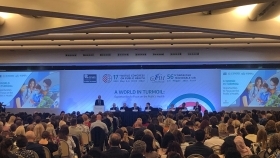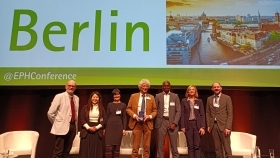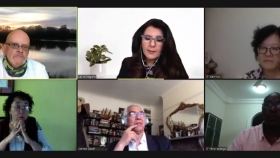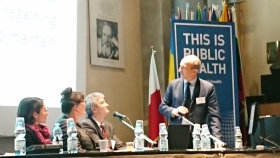
by strengthening education and training
of public health professionals
for both practice and research



The Association of Schools of Public Health in the European Region (ASPHER)
ASPHER is the key independent European organisation dedicated to strengthening the role of public health by improving education and training of public health professionals for both practice and research.Secretariat updates
Download the statement PDF here.
The role of the public health community is to prevent disease, disability, injury, and death. The Association of Schools of Public Health in the European Region (ASPHER) has expressed grave concern about the horrific Hamas attacks in Israel on October 7th, 2023, that led to the murder of about 1,200 people and the abduction of more than 250 to Gaza. (1) In our subsequent statement we continued to express grave concern about thesubsequent Israeli war on Hamas and the resulting collateral destruction of large parts of Gaza, in particular of hospitals and other civilian infrastructure, in the battle with Hamas. (2) This collateral damage has resulted in nearly 35,000 people killed (as of May 10, 2024), many of them women, children, and other non-combatants. Almost three-quarters of buildings and large areas of agricultural land have been damaged or destroyed. Famine is setting in. There has been enforced displacement of nearly 2 million Gazans. About 200,000 Israelis have also been displaced from their homes on the border with Gaza. We called for “...massive humanitarian efforts to be allowed into Gaza, to enable urgent treatment for wounded civilians, and towards rehabilitation and recovery for the civilian population." (2)
We continue to express our horror and deep sadness at the suffering of more than 2 million people. We believe the treatment of the captured hostages is cruel and intolerable, and we call for their immediate and unconditional release. We are especially concerned about the effects of the conflict on children on both sides. (3) The current conflict has created multiple adverse childhood experiences which are known to damage physical and mental health for a child’s lifetime. (4) In this case, the outcomes will be devastating for whole generations. They have been robbed of innocence, robbed of dignity, and robbed of basic necessities of life. They face a lifetime of poor physical and mental health, and potentially will nurse grievances, hatred, and a desire for revenge, which can continue over new generations. (3) Trauma-informed health and social care will be needed to address the extreme burden of mental ill health, which is affecting care givers, as well as the rest of the population. (5)
An environmental disaster is unfolding in Gaza, particularly, in relation to the absence of clean water and sanitation (3,6) We commend the efforts of EcoPeace Middle East and others seeking to document and address the environmental destruction in Gaza. Their work in Israel, Palestine, and Jordan is a unique organisational and partnership approach which is a vital resource to protect and improve if the environment and its ecosystems which are not confined to a single country. (7)
The humanitarian disaster and the United Nations Relief and Works Agency (UNRWA)
Humanitarian aid, especially food, water, medications, and vaccines must be allowed to enter Gaza to compensate for the poor nutritional and health status that all Gazans have suffered since October 7th, 2023, and over many years previously. (3) Humanitarian aid flow is jeopardised by the threat to the future of UNRWA. (8)
UNRWA is needed to ensure access to humanitarian aid, health, and education services to the people of Gaza in general, and the most vulnerable, in particular. (9) The potential defunding of this organisation by the United States and other nations, represents a major threat to the combined international aid efforts to support Gazans at the barest minimum level at this moment. With all the needed reforms in this organization, currently and in the short term UNRWA is doing vital work.
Essential services such as the provision of immunization, education, and food supplies must continue, including the monitoring of health and nutritional status of the population of Gaza and ensure that they have adequate shelter, water, sanitation, and hygiene, as well as food and nutrition security. This should comply with the humanitarian principles and be done in coordination with United Nations Cluster System (10) and follow the SPHERE Standards. (11)
There are calls for UNRWA to be reformed for the future. The UN Independent review makes substantial recommendations for the governance of UNRWA, for transparency and increased accountability, and for improving its partnerships and communications with UN bodies, NGOs, and governments in the region. (12) There is a need to further review the functions and operations of UNRWA and for reform. (13,14) But that is for future consideration; fundamental change at this point in the emergency would add to the disaster. (14)
The threat to humanitarian aid workers
At the time of the killings of seven of World Central Kitchen’s team members on April 1st, 2024, there were a total of 224 humanitarian aid workers who had been killed in Gaza. (15) These are the highest numbers of deaths of humanitarian workers recorded in any single conflict anywhere in the world. (16)
We join with the UN Security council in expressing our grave concern about the loss of these civilian lives and call on all parties to the conflict to fully respect the protected status of humanitarian workers, facilities, and operations under international law, abide by humanitarian notification and deconfliction mechanisms, and immediately remediate any deficiencies in these mechanisms. (15)
An extension of war into Rafah
In addition to the current level of destruction, food and water shortage, homelessness and destroyed health care services, we are at the brink of an extension of the humanitarian catastrophe, because of the threat by Israel to go into Rafah, where the talk is of moving something more than a million people out. (17)
Further military escalation would constitute a massive expansion of an already intolerable humanitarian disaster. We have reached the situation where we have to prevent further damage and look to the future.
Delivering humanitarian aid
International humanitarian organizations and governments must also guarantee that aid reaches its legitimate target, the most vulnerable, including the children of Gaza. (3) This is not an easy task, but a necessary one. Israel, Egypt, and their international governmental and nongovernmental partners need to further augment and improve the scale and coordination of aid and rehabilitation efforts.
We repeat here what some of our Israeli colleagues have said recently:
“It is understandable that some Israelis, especially those with relatives still held captive in Gaza, are reluctant to enable the transfer of aid via Israel, having received no signs of life or assurances of the delivery of essential medicines from their loved ones. The Israeli nation, after experiencing an unprecedented national trauma on 7th October, and ongoing grief thereafter, struggles to express empathy for Gazans. As eloquentlystated by Yuval Noah Harari, ‘The mind is filled to the brim with our own pain, and no space is left to even acknowledge the pain of the others.’ “
“However, the [Israeli] government must rise above this anguish and “do the right thing” from an ethical, legal, and humanitarian point of view, and not least in order to protect the interests of Israel on the world stage.” (3)
ASPHER’s position is that we must prevent an extension of the current humanitarian disaster. We urge both sides to come together for a strong and meaningful ceasefire; but more than that, for both sides to commit to not attacking the other; and to make clear and firm commitments to non-violent resolution of problems which can lead to lasting peace and a better future for Israelis and Palestinians and for all the neighbouring countries in the region.
Even if the war ends tomorrow, there is immense public health work to be done for years. The public health community and schools of public health stand ready to support efforts to improve health and the environment in Gaza and in the rest of the region. Peace is the essential foundation on which healthy lives can be rebuilt.
The Association of Schools of Public Health in the European Region, May 13th 2024
References
- ASPHER. ASPHER statement condemning terrorist attacks on civilian populations. Association of Schools of Public Health in the European Region, October 10th 2023. Available at: https://www.aspher.org/download/1449/aspher-statement-condemning-terrorist-attacks-on-civilian-populations.pdf
- Razum O, Barach P, Bochenek T, Cunningham C, Davidovitch N, Kostoulas P, Lindert J, Lopes H, Prikazsky V, Reid J, Tiljak MK and Middleton J (2024) Statement of the ASPHER Task Force on War and Public Health on the Conflict in Israel/Palestine. Public Health Rev 45:1607047. doi: 10.3389/phrs.2024.1607047
- Paltiel O, Manor O, Calderon Margalit R, Baron Epel O, Bar Zeev Y, Berry E, Clarfield AM, Dann EJ, Davidovitch N, Donchin M, Green M, Hochner H, Neumark Y, Nitzan D, Paltiel A, Razum O, Rosen B and Rudolf M (2024) Children on the Gaza-Israel Border: Victims of War. Public Health Rev 45:1607192. doi: 10.3389/phrs.2024.1607192.
- Bellis M et al. Tackling adverse childhood experiences: state of the art and options for action. Public Health Wales, WHO EURO, Liverpool John Moores University. January 23rd 2023. https://www.ljmu.ac.uk/-/media/phi-reports/pdf/2023-01-state-of-the-art-report-eng.pdf
- Lev N, Ben David-Dror Y, Goldblatt H, Armon D, Krontal S, Tavori G. Davidovitch N. Caring for Those Who Give Care in the Wake of the October 7th War: The Effect of Trauma Exposure on Healthcare Professionals and Coping with It on a Personal, Professional, and Systemic Level. Taub Center for Social Policies in Israel. April 16th, 2024. Available at: https://www.taubcenter.org.il/en/caring-for-caregivers/
- Razum O, Agha H, Davidovitch N, McCall T and Shapira S (2024) Gaza Ceasefire: Improve WASH, Promote Cooperation. Int J Public Health 69:1607412. doi: 0.3389/ijph.2024.1607412
- Ecopeace. About webpage. Available at: https://ecopeaceme.org/about/
- Reuters News Agency. WHO Chief says defunding UNRWA will have ‘catastrophic’ consequences. Reuters, January 31st 2024. Available at: https://www.reuters.com/world/middle-east/who-chief-says-defunding-unrwa-will-have-catastrophic-consequences-2024-01-31/
- Green M. UNRWA: United Nations Relief and Works Agency (for Palestinian Refugees in the Near East) ASPHER task force for Emergencies, April 4th 2024. Slide presentation. Available at: https://www.aspher.org/download/1513/unrwa-10-2-24.pdf
- United Nations High Commission for Refugees. Emergency handbook: Cluster Approach. Geneva: UNHCR, 2024. Available at: https://emergency.unhcr.org/coordination-and-communication/cluster-system/cluster-approach#:~:text=A%20cluster%20approach%20may%20be,Increasing%20transparency%20and%20accountability.
- SPHERE. Core humanitarian standards. Geneva: SPHERE, 2018. Available at: https://www.spherestandards.org/humanitarian-standards/core-humanitarian-standard/
- Final report to the UN Secretary-General. Independent review of mechanisms and procedures to ensure adherence by UNRWA to the humanitarian principle of neutrality. (Chair: Catherine Colonna). New York: United Nations Organisation, April 29th 2024. Available at: https://www.un.org/sites/un2.un.org/files/2024/04/unrwa_independent_review_on_neutrality.pdf
- The Economist editorial. The real problem with the UN’s agency for Palestinians: It has perpetuated the misery of Palestinians. The Economist, February 15th 2024. Available at: https://www.economist.com/middle-east-and-africa/2024/02/15/the-real-problem-with-the-uns-agency-for-palestinians
- Lincoln J. Overhaul UNRWA—Just Not Right Now: The Aid Agency Is Flawed, but It Is Also Saving Palestinian Lives. New York: Foreign Affairs. March 29th 2024. Available at:
- UN Press statement 11/4/24 Press Statement on Humanitarian Workers and Threat of Famine in Gaza New York: United Nations, April 11th, 2024. Available at: https://www.foreignaffairs.com/israel/overhaul-unrwa-just-not-right-now
- Salzenstein L. Behind the numbers: Gaza’s unprecedented aid worker death toll. The new humanitarian March 24th, 2024. Available at: https://www.thenewhumanitarian.org/maps-and-graphics/2024/03/21/behind-numbers-gaza-unprecedented-aid-worker-death-toll#:~:text=Most%20UNRWA%20staff%20died%20during,corresponds%20to%20the%20wider%20population
- Guterres A. UN Secretary General Urgent Plea for Peace – Rafah invasion risks devastating humanitarian consequences. New York: United Nations, available at: https://www.youtube.com/watch?v=ubbUYcqdF0A
Additional past work of ASPHER on Public Health and peace/war
- Wandschneider, L., Namer, Y., Davidovitch, N., Nitzan, D., Otok, R., Leighton, L., Signorelli, C., Middleton, J., Martin-Moreno, J. M., Chambaud, L., Lopes, H., & Razum, O. (2022). The Role of Europe’s Schools of Public Health in Times of War: ASPHER Statement on the War Against Ukraine [ASPHER Statement]. Public Health Reviews, 43, 1604880. https://doi.org/10.3389/phrs.2022.1604880
- Namer, Y., Wandschneider, L., Middleton, J., Davidovitch, N., & Razum, O. (2021). How can Schools of Public Health Actively Promote Peace? [Editorial]. Public Health Reviews, 42(19). https://doi.org/10.3389/phrs.2021.1604459
- Razum, O., Barros, H., Buckingham, R., Codd, M., Czabanowska, K., Künzli, N., Lyubomirova, K., Otok, R., Signorelli, C., & Middleton, J. (2019). Is war a man-made public health problem? The Lancet, 394(10209), 1613. https://doi.org/10.1016/S0140-6736(19)31900-2
Terms of use · Transparency statement ·Tel: +32 2 735 0890 ·Skype: ASPHERskype ·Mail: office@aspher.org ·Share:
ADDRESS
Aspher SecretariatUM Brussels Campus
Av de l'Armée / Legerlaan 10
BE-1040 Brussels





